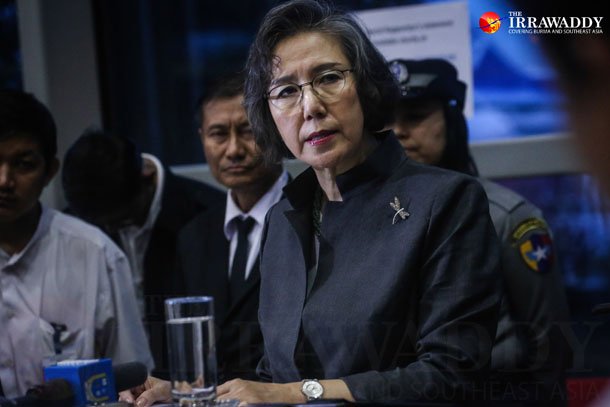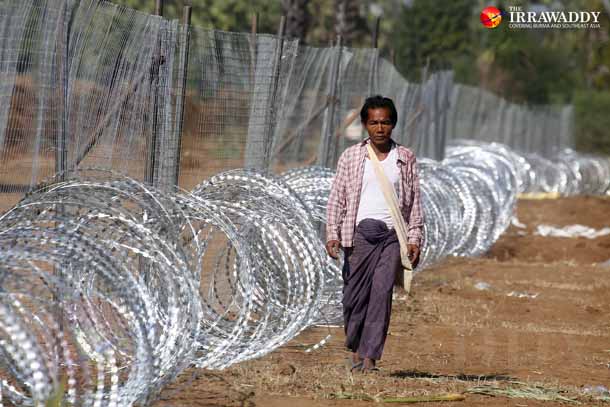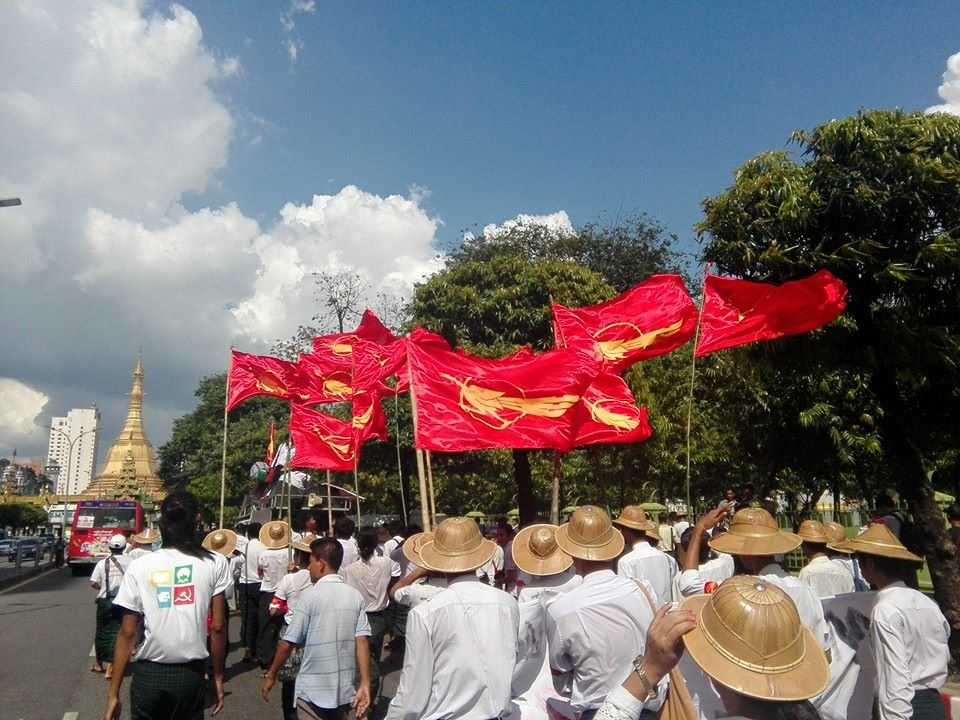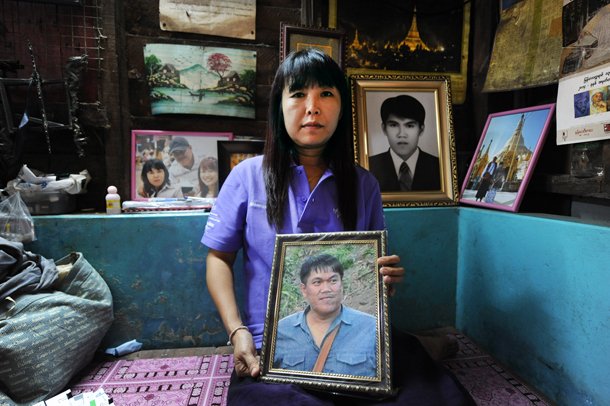Posts Tagged ‘Burma Army’ (238 found)
Kachin National Organization (KNO) Condemns Rape and Murder of Two Kachin Teachers and Calls for Inqury on Crime against Humanity
KNO strongly condemned the rape and brutal murder of Maran Lu Ra (20 years old) and Tangbau Hkawn Nan Tsin (21 years old), who were volunteer teachers of the Kachin Baptist Convention’s Education Ministry Program. They were gang-raped, severely tortured and murdered in Kawng-Hka village, Nam Tau, Mung Mau district in Northern Shan State by Burma Army soldiers from 503 Light Infantry Regiment, commanded by Major Aung Soe Myin, stationed at the village since 17th January 2015. […]
• • •Myanmar: Investigate Alleged Rape and Killing of Two Kachin Women
The Myanmar authorities must ensure that a prompt, independent, impartial and effective investigation into the killing and alleged rape of two young Kachin women is carried out. Failure to investigate these allegations and hold those responsible to account would deny the victims and their families justice and contribute to an ongoing climate of impunity for rape and other crimes of sexual violence, in particular in conflict-affected and ethnic minority areas. […]
• • •2 Kachin teachers brutally raped and killed by Burmese Army
Burma Campaign UK has confirmed reports that two ethnic Kachin teachers were raped by Burmese Army soldiers overnight on 19th/20th January.
Burma Campaign UK is calling on the British government to implement provisions in its Preventing Sexual Violence Initiative and dispatch a team of experts to Burma to investigate the case. Burma Campaign UK is also calling on the British government to halt its training of the Burmese Army, which is currently taking place […]
• • •The Facts are Plain and Stated. It is Time to Act!
 The US Special Envoy for Human Rights in Burma, US Assistant Secretary of State Tom Malinowski and his accompanying delegation, completed the second trip of this kind, highlighting the plethora of grave human rights concerns that continue to plague the people of Burma. On the same day, the UN Special Rapporteur on the situation of human rights in Burma, Yanghee Lee, also gave a stark analysis of progress in human rights.
The US Special Envoy for Human Rights in Burma, US Assistant Secretary of State Tom Malinowski and his accompanying delegation, completed the second trip of this kind, highlighting the plethora of grave human rights concerns that continue to plague the people of Burma. On the same day, the UN Special Rapporteur on the situation of human rights in Burma, Yanghee Lee, also gave a stark analysis of progress in human rights.
The two day, US-Myanmar Human Rights Dialogue visit included meetings with Union ministers in a closed door arrangement in Naypyidaw as well as meetings with civil society in Rangoon and Myitkyina, the capital of war-torn Kachin State. The 10-day trip of Special Rapporteur Yanghee Lee also included meetings with various government and civil society representatives, as well as visits to the site of the Letpadaung Copper Mine, Insein Prison, Arakan State, and Lashio, northern Shan State.
• • •Letpadaung Crisis Takes a Turn for the Worse
 As 2014 ended seeing Burma’s reforms backsliding and the peace process stalling, Burma welcomed 2015 with many unresolved issues continuing to face people across the country.
As 2014 ended seeing Burma’s reforms backsliding and the peace process stalling, Burma welcomed 2015 with many unresolved issues continuing to face people across the country.
The ongoing dispute between local villagers and the Burma Government and Wanbao, a Chinese mining company, over land grabs and environmental damage continues to rumble on as police shot dead Daw Khin Win as she was demonstrating against the controversial Letpadaung mining project in Sagaing Region. Meanwhile, the police continue to arrest and detain activists who speak out against such violence on politically motivated charges, underlining the dire need for legal and judicial reform and the complete lack of the rule of law in Burma […]
• • •Burma Army Kill Villager in Front of His Parents, then Force over 1,200 Villagers to Demonstrate Against “Insurgents” for Killing Civilians in Murng Yawng
Burma Army kill villager in front of his parents, then force over 1,200 villagers to demonstrate against “insurgents” for killing civilians in Murng Yawng
On December 12, 2014, Burma Army troops from LIB 573 shot and killed a 32-year-old mentally ill villager, Sai Sarm Tip, at his house in front of his parents, in the village of Wan Tinn, in Murng Yawng, eastern Shan State. The troops had surrounded the house, ordered Sai Sarm Tip to come out, then shot him as he stepped outside […]
• • •Myanmar: Drop Charges Against Father of Slain School-Girl
(Bangkok, December 18, 2014)— Authorities in Myanmar should drop criminal charges against human rights defender Shayam Brang Shawng, said Fortify Rights and five leading international human rights organizations in an open letter to President Thein Sein published today. Brang Shawng, 49, faces two or more years in prison for filing a complaint with the Myanmar National Human Rights Commission (MNHRC) that alleged the Myanmar Army was responsible for the death of his 14-year-old ethnic-Kachin daughter, Ja Seng Ing […]
• • •As 2014 Comes to an End, Students Hold Key to New Chapter in Burma Politics
 As we count down the remaining days of 2014, Burma Partnership takes a look back at what 2014 has offered. It has been nearly four years since President Thein Sein’s administration took office, and now is the time to digest all the developments during his presidency, to assess what the so-called reform process has really meant for the people of Burma thus far. And now is the time to properly examine this new political landscape and to determine who is who.
As we count down the remaining days of 2014, Burma Partnership takes a look back at what 2014 has offered. It has been nearly four years since President Thein Sein’s administration took office, and now is the time to digest all the developments during his presidency, to assess what the so-called reform process has really meant for the people of Burma thus far. And now is the time to properly examine this new political landscape and to determine who is who.
By the time the reforms were announced, everything was already set in motion to ensure that the reform process was controlled and manipulated by members of the old military regime. Looking at the notorious 2008 Constitution, the institutionalized prescription of 25 per cent of the seats in Parliament for military representatives, the dominance of the Union Solidarity and Development Party, the excessive power of the Burma Army and the National Defense and Security Council, and the growing investment of the State and affiliated business cronies in the media sector, it is not hard to conclude that a new system of repressive governance has been installed – by the same people who were once considered one of the most brutal and authoritarian regimes in the world.
However, it is important to remain hopeful. Although the new political landscape has contributed to the sophistication of old problems and the development of new problems, it has also offered Burma people new opportunities. One of the most inspiring aspects of the political developments in 2014 has been the reinstatement of the role of student unions in the country’s political affairs. Burma’s students were always at the center of major democracy movements throughout history – most notably in 1988 – and have now made a comeback. […]
• • •Statement by Karen Community Based Organizations Welcoming the Release By The International Human Rights Clinic at Harvard Law School of, “War Crimes and Crimes Against Humanity in Eastern Myanmar” It’s Time For Justice
The Karen people have suffered decades of abuse at the hands of the various forms of the Burmese dictatorship and Burmese military. We have grown up witnessing rape, murder, forced labor, destruction of villages, bombing of civilians and a wide variety of other human rights abuses. We know there are those who ordered those abuses who continue to serve in the highest levels of the Government of Burma and in the Burmese military. We live this experience. We continue to seek a full investigation and the prosecution of those responsible.
• • •As the Burma Army Fires Live Rounds, the MNHRC Fires Blanks
 The Myanmar National Human Rights Commission (MNHRC) once again proved the futility of its existence with a deeply unsatisfactory investigation into the murder of journalist Aung Kyaw Naing, a.k.a. Ko Par Gyi by the Burma Army. Rather than providing meaningful avenues for redress for the victim and his family, the investigation report serves to act as a cover for the Burma Army, which is continuing to commit such human rights abuses throughout Burma’s ethnic areas.
The Myanmar National Human Rights Commission (MNHRC) once again proved the futility of its existence with a deeply unsatisfactory investigation into the murder of journalist Aung Kyaw Naing, a.k.a. Ko Par Gyi by the Burma Army. Rather than providing meaningful avenues for redress for the victim and his family, the investigation report serves to act as a cover for the Burma Army, which is continuing to commit such human rights abuses throughout Burma’s ethnic areas.
Ko Par Gyi was a freelance journalist covering the conflict between the Democratic Karen Benevolent Army (DKBA) and the Burma Army when he was taken into military custody. Five days later he was tortured before being shot to death. The marks of torture were obvious to Ma Thandar, Ko Par Gyi’s wife, when she viewed the dead body. After calls from human rights groups as well as the US State Department, for an independent investigation, President Thein Sein consequently asked the MNHRC to conduct an investigation, the results of which were released on 2 December 2014.
The MNRHC investigation report, however, does not address the key issues surrounding this case, is full of inconsistencies, and does not include key pieces of evidence. It does not provide any explanation of the signs of torture that were clear on his body. The report claims that there had been a fight in which the gun had gone off; however, according to forensic experts that Ko Par Gyi’s wife has spoken to, he had been shot five times, one of which was point blank through the chin, implying that he had been shot four times before being killed. […]
• • •








 All posts
All posts